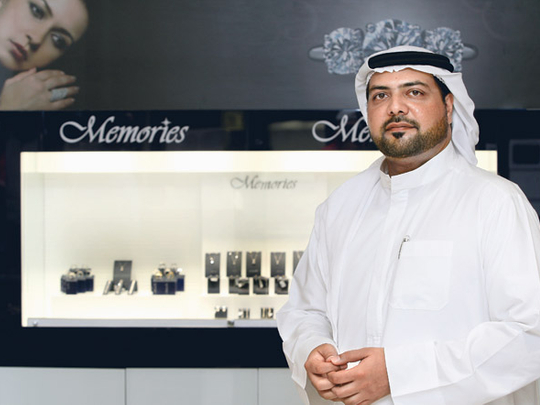
Dubai: During the economic crisis, many consumers would rather keep their money in their wallets than on their fingers, necks or ears. As people re-examine their budgets, jewellery is turning out to be one of the easiest places to cut back in terms of business and trade.
"Yet the understandable penny-pinching by consumers is putting a painful squeeze on the jewellery industry," Raed Ahmad Baker, chairman of Liali jewellery, told Gulf News in an exclusive interview.
Liali is a renowned UAE jewellery brand that established its first shop in Jumeirah in 1998.
It later expanded to include 22 retail outlets in the UAE, two in Spain and one in Bahrain.
Recently, however, the downturn in consumer spending has forced jewellery retailers to offer deep discounts.
In some cases, it has even spurred store closings and resulted in job cuts at boutiques and department stores.
Most affected
Baker, who has five companies in the iron industry, real estate and health care, said that the jewellery business has been severely affected by the global economic downturn.
"Liali as any other company in the UAE has [been] hit by the global storm, but nothing [is] going to be worse," he said.
He reasoned that because jewellery is expensive to stock — one which moves slowly even in good economic times many stores are burdened with debt even though the wholesale prices of polished diamonds fell in June compared to a year earlier.
Baker said: "Jewellery is a difficult business. It is not a daily need but rather an occasional requisite. Moreover, Dubai is a small city and a saturated market with high competition."
Baker recalls that when heo renewed the company's licence at the Dubai Economic Department in the second year of his business, 318 new licences had been issued for jewellery companies. Today, the number has risen to 800.
While sales fell 22 per cent, Liali is set to open a new outlet in Mirdif City Centre with another slotted for Abu Dhabi in the coming months.
Baker said that despite this drop, Liali's performance was better compared to the overall Dubai market which witnessed a sharp 60 per cent decline.
No one was ready for the crisis, he said, adding:
"Today the market is different and the luxury period we lived in from 1997 till 2004 will not come back. The challenges have increased and financial demand as well as cost [have] grown."
However, he believes that things are starting to build up: "Thank God business and situations are getting better."
After studying International Business in Canada, Baker ventured into the jewellery business at the age of 26 as a hobby. He started out with Dh1.3 million, which he helped turn into Dh150 million in 12 years.
A novice, Baker soon became an expert while managing 22 outlets and a workshop with his Indian partner.
"For the first five years in this business I used to listen and see how it was operating until I became an expert," he said.
Baker has his own designs but said that they would be difficult to sell as they are unconventional and more expensive. His first design was for the word Allah in Arabic.
Baker says he feels a sense of achievement when he sees people carrying a Liali bag. He attributed the drop in sales to a fall in consumer spending on gold, due to its high price.
He said: "Being more creative is one of the main aspects that helps us manage our business during the crisis. We concentrate on diamonds and precious stones because gold's price is very high and you can't convince customers.
Out of the box
"Naturally in such [a] crisis you should be [able to think] out of the box... the solution is to do more business and keep it going."
"We have started designing affordable [and] fashionable pieces while avoiding traditional designs, to suit customer tastes."
Liali is one of the leading jewellery brands in the UAE that has built good relations with its customers, he added.
"Liali is available everywhere in Dubai to meet demand, by selling jewellery at affordable prices.
There are shops, he said, such as the one in Spinney's, that sells jewellery ranging from Dh500 to Dh3,000.
While experts say that during this shake-out far fewer jewellers will be left, Baker believes that Liali will continue to be as strong as it currently is in the market.
"We didn't close any shop or cut down [on] staff numbers and we are going ahead with our expansion plan."
Modified designs
However, Liali has controlled production and introduced new designs.
However, Baker says that businessmen should work day-to-day and be more conservative in their approach.
"Businessmen should care to survive and not think about profits, especially in the [current] economic situation."
Comparing the jewellery business in Dubai to other countries in the world, Baker says the emirate is still the hub of the gold trade.
"We can't deny that even Dubai [has been] affected but the drop was in the unreal growth which we had during [the] 2008 boom."
He added that Dubai is the city of gold — a place where one can buy cheap and tax-free jewellery without paying custom duties.
The margin of sales is very healthy and competitive as it varies from one retailer to another by 10 per cent to 20 per cent less.
"Nothing will stop Dubai's gold trade from growing. The crisis is temporary and won't dislodge Dubai's status."
Baker said that the lesson they learnt from the economic meltdown is to go out of the box and do more business in different markets.
"The crisis moved us extra miles. It was a good time to revise our business and what we have and a motive to look for alternative markets."












